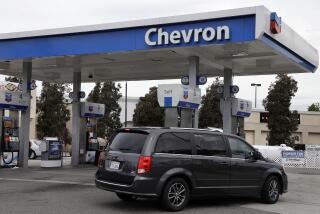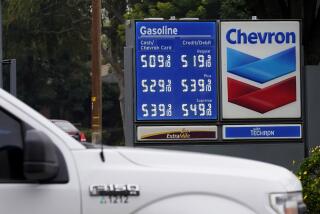Tenneco to Get $7 Billion From Oil, Gas Auction : Chevron Buys Top Share of Reserves at Huge Sale; Prices Called Premium
- Share via
One of the oil industry’s biggest auctions drew to a close Monday when Tenneco, the Houston-based conglomerate that is bailing out of the oil and gas business, announced that it will gross more than $7.3 billion from a massive sale of its energy assets.
The price was considered a premium, despite the dismal economic climate in the Oil Patch over the past several months. As such, it was seen as a signal that the U.S. oil industry--which made most of the successful bids--expects energy prices to rise sooner or later.
For the record:
12:00 a.m. Oct. 12, 1988 FOR THE RECORD
Los Angeles Times Wednesday October 12, 1988 Home Edition Business Part 4 Page 2 Column 2 Financial Desk 2 inches; 38 words Type of Material: Correction
The story published Oct. 11 on Tenneco’s sale of oil and gas holdings for $7.3 billion reported incorrectly the sale of 450 service stations. Mobil Oil Corp. paid $560 million for a Louisiana oil refinery. No buyer of the service stations had been identified as of Tuesday.
Despite widespread rumors that cash-rich Exxon would walk away with most of Tenneco’s oil and gas properties, the biggest single buyer turned out to be Chevron Corp. of San Francisco. Chevron announced that it will buy Tenneco’s Gulf of Mexico oil and gas reserves for $2.6 billion.
Though not all the buyers identified themselves Monday, most that did so were major U.S.-based energy companies and none was a foreign government. Several national oil companies were understood to be interested in acquiring Tenneco’s Chalmette, La., refinery.
Other major purchasers:
- Atlantic Richfield won the bidding for Tenneco’s sizable California holdings. Arco said the acquisition will cost it between $670 million and $700 million. Tenneco’s holdings in Kern County make it the state’s eighth-biggest oil producer.
- Mobil Oil Corp. will buy the Louisiana refinery and network of 450 gasoline-convenience store retail outlets in the Southeast for $560 million.
- Amoco, the former Standard Oil of Indiana, said it would buy the Rocky Mountain division--chiefly oil and gas reserves in New Mexico--for about $900 million.
- Mesa Petroleum, the partnership headed by T. Boone Pickens Jr., will acquire Tenneco’s interests in the Hugoton Field in southwestern Kansas, the nation’s biggest natural gas field, for $715 million.
- American Petrofina, a subsidiary of Petrofina SA of Belgium, will pay $600 million for Tenneco’s oil and gas reserves in Texas and Louisiana.
- Conoco Inc., part of Du Pont, said it will pay $115 million in stock for Tenneco’s interests in the Norwegian North Sea.
Estimates of the likely price for Tenneco’s oil and gas units had ranged all the way from $4 billion to $8 billion. Consultants John S. Herold Inc. of Greenwich, Conn., had valued the entire package at $5.4 billion.
Tenneco appeared to be getting about $7 per barrel, considered a handsome sum today for oil still in the ground. A continuing worldwide glut has driven prices for the benchmark U.S. crude oil down to the $13 range from above $18 as recently as April. In late 1985, the same oil brought about $30 per barrel.
Bullish Outlook for Gas
“These prices are generally very admirable as far as Tenneco is concerned,” said John Olson, vice president and oil analyst in the Houston office of Drexel Burnham Lambert. “Let’s say they are generous in light of where prices have been lately.”
Tenneco stock closed higher on the news. On the New York Stock Exchange, the stock was up $1 at $49.75 a share.
But Olson and other analysts said a bullish outlook for natural gas prices made the Tenneco package especially attractive. On an energy-equivalent basis, more than half the reserves being sold are natural gas, which has risen in price in the last year while oil prices fell.
Proven Reserves
Olson said Tenneco’s decision to sell “is looking very good near term. Longer term, I’m not so sure.” He said he disagrees with “the judgment that oil field economics are going to look lousy for the next five years.”
Chevron estimated that it was getting oil and natural gas that is the energy equivalent of 600 million barrels of oil. Only about 60% are considered proven reserves, the company said. On that basis, it appeared that Chevron is paying about $7.20 per barrel. But if all 600 million barrels prove out, it is paying below $5.
The deal also includes 600,000 acres for exploration in the Gulf of Mexico, doubling Chevron’s undeveloped holdings there.
Chevron said the purchase will make it the nation’s biggest producer of natural gas. The properties are currently producing 700 million cubic feet of gas and 40,000 barrels of crude oil per day. Chevron USA President Willis J. Price said: “Most people will conclude from today’s announcement that Chevron is bullish on natural gas, and that’s absolutely right.”
Triple Output in State
Paul D. Mlotok, who follows Chevron for Salomon Bros. in New York, called it a smart move because the company can afford it and it is a safer way to “find” oil and gas than drilling. Chevron said at least 75% of the purchase price will come from its $4.6 billion in cash reserves.
Meanwhile, Arco estimated its acquisition at 100 million barrels of oil or its equivalent. Los Angeles-based Arco, which remains heavily reliant on its Alaska production but has recently bought reserves in Britain’s North Sea as well, said the purchase will triple its California production. Tenneco is now pumping 32,000 barrels of crude and 24 million cubic feet of gas per day in California.
The company is also buying almost 500,000 undeveloped acres in Kern County.
All the sales are subject to antitrust review under the Hart-Scott-Rodino Act. In most cases, the parties said they hope to close the deals by Dec. 31.
Roughly $1 billion in sales had not been publicly accounted for Monday. No buyers have been identified for Tenneco’s overseas holdings in Colombia, the British North Sea, the African nation of Gabon, and propane and methanol properties in this country.
Tenneco stunned the energy community in May by announcing that a heavy debt load and the uncertain outlook for oil and natural gas prices had persuaded it to sell off most of its energy holdings, whose $3.5 billion in revenues last year accounted for 22% of companywide revenue.
The rest of the company consists of a natural gas pipeline network, shipbuilding, auto parts, farm implements, chemicals and packaging.
Rumored Buyers
Boasting that its reserves, equivalent to 900 million barrels of oil, were the highest quality reserves ever offered for sale, Tenneco entertained bids from about 80 companies. It set up an elaborate network of “data rooms” in Houston, Bakersfield, Denver and other cities where would-be buyers waded through seismic, financial, legal, environmental and other information in August.
Rumored buyers had ranged from Exxon to the national oil companies in Venezuela, Nigeria, Mexico and Iraq.
Also conspicuous by their absence from the winning bids divulged Monday were Pennzoil, which has plenty of cash from its recent $3-billion court settlement with Texaco; British Petroleum, which has been looking for more U.S. energy holdings, and the Japanese, who have also been investing heavily in the U.S. Oil Patch.
More to Read
Inside the business of entertainment
The Wide Shot brings you news, analysis and insights on everything from streaming wars to production — and what it all means for the future.
You may occasionally receive promotional content from the Los Angeles Times.










